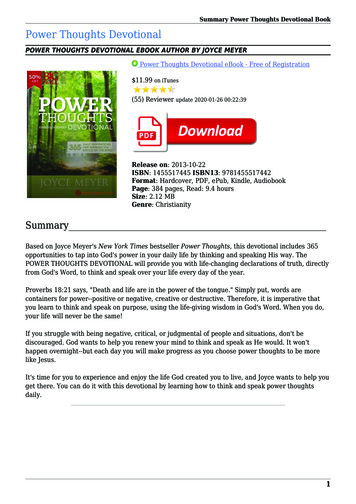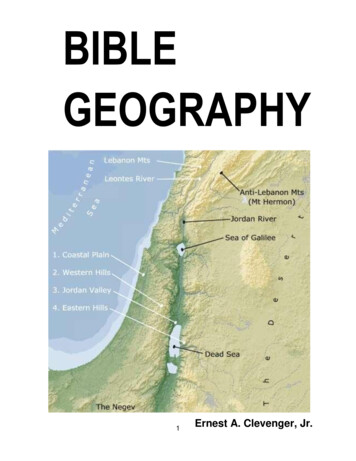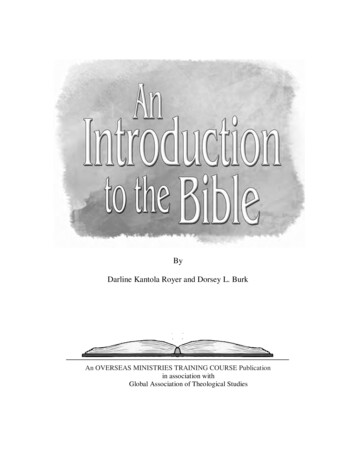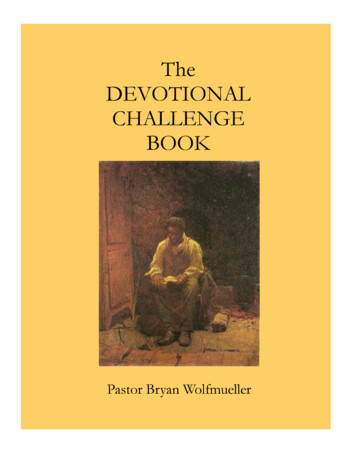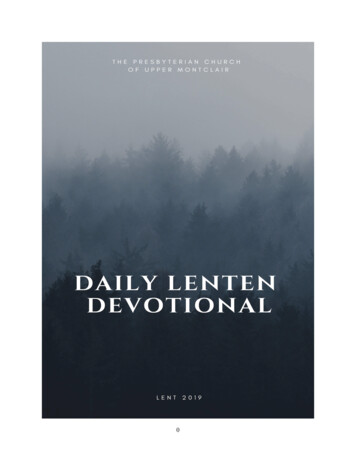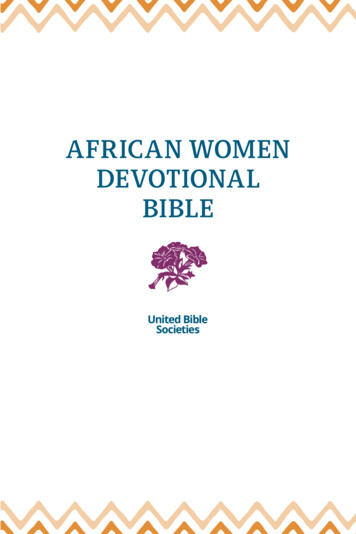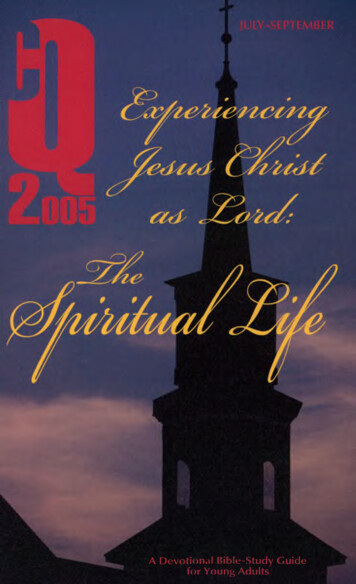
Transcription
A D e v o tio n a l B ib le -S tu d y G u id efo r Y o u n g A d u lts
http://cq.adventist.org
E x p e rie n cin g JesusC h r is t as Lord:T h e Sp iritu al LifeJULY—SEPTEMBER 2005S ta ffEditor:Gary B. SwansonEditorial Assistant: Shirlee J. IngramR e a d in g C o m m it t e eKathy BeaglesLyndelle ChiomentiTim PoirierBiblical Research InstitutePat HabadaKen RogersJames BlackJonathan KuntarafJim ZackrisonCO is written by Seventh-day Adventist young adults and their friends around the world.Editorial Office: Sabbath School/Personal Ministries Department, General Conference ofSeventh-day Adventists, 12501 Old Columbia Pike, Silver Spring, MD 20904, U.S.A.Place orders with: Pacific Press Pub. Assn., P.O. Box 5353, Nampa, ID 83653-5353, U.S.A.Other than the King James Version, Scripture versions used in this Bible study guide are as follows:NEW INTERNATIONAL VERSION (NIV)Texts credited to the NIV are from the Holy Bible, New International Version. Copyright 1973, 1978, 1984 by theInternational Bible Society. Used by permission of Zondervan Bible Publishers.NEW KING JAMES VERSION (NKJV)Text credited to NKJV are from the New King James Version. Copyright 1979,1980,1982 by Thomas Nelson, Inc. Usedby permission. All rights reserved.NEW REVISED STANDARD VERSION (NRSV)From the New Revised Standard Version of the Bible, copyright 1989 by the Division of Christian Education of theNational Council of the Churches of Christ in the USA. Used by permission. All rights reserved.REVISED STANDARD VERSION (RSV)From the Revised Standard Version of the Bible, copyright 1946, 1952, 1971 by the Division of Christian Education ofthe National Council of the Churches of Christ in the U.S.A. Used by permission. All rights reserved.CQ (ISSN 0744-2939). Volume 28, No. 3. Published quarterly by the General Conference of Seventh-day Adventists, 1350North Kings Road, Nampa, ID 83687-3193, U.S.A., and printed by Pacific Press Publishing Association, 1350 NorthKings Road, Nampa, ID 83687-3193, U.S.A. Place orders with Pacific Press Publishing Association, P.O. Box 5353,Nampa, ID 83653-5353, U.S.A.One-year subscription in NAD, 15.60; single copy, 6.29. One-year subscription in countries outside NAD, 18.60; sin gle copy, 6.29. All prices at U.S.A. exchange. Periodicals postage paid at Nampa, ID 83687.POSTMASTER: Send address changes to CQ, P.O. Box 5353, Nampa, ID 83653-5353, U.S.A. Send editorial inquiries toCO, 12501 Old Columbia Pike, Silver Spring, MD 20904, U.S.A. Send circulation inquiries to Pacific Press PublishingAssociation, P.O. Box 5353, Nampa, ID 83653-5353, U.S.A. When a change of address is desired, please send both oldand new addresses.Copyright 2005 by the Sabbath School/Personal Ministries Department, General Conference of Seventh-day Adventists.Printed in the U.S.A.
E x p e rie n cin g Jesu sC h ris t as Lord:T h e Sp iritual Life1.ourLordandSavior Jesus Christ . . .10Peter Bush, Nana Fezeka Dlamini, Amanda Khoza, AyandaMoropane, Sebastian Engelbrecht, Gosnell L. O. R. Yorke2. Lordof ourPriorities .19Andreas Beccai, Marsha Brooks, Alfred Eccles, Fayola Jack,Shelema Thompson, George Yeboah3. Lordof ourThoughts .28Timothy Gillespie, Stacey-Ann Grant, Omosa Protas Mwamba, TomOwiti, Miranda Simkin, Cesar B. Tavarez4. Lordof ourDesires .37Joelson Borges, Deise Lobo Franco, Marcelo Lobo Franco, JuniorPaiva, Emerson Tomaz de Oliveira5. Lordof ourSpeech. 46Maurice Alexander, Dawn Foster, Larnalisa Jackson, Kirt James,Reneé Joseph, Cadell Monrose6. Lordof ourPrayers .55Edison Flores, Jr., Ranah Jane Ompod, Darryl Picar, MeisheRicohermoso, Levangel Sta. Lucia, Richmund Sta. Lucia7. Lordof ourRelationships .64Kyle Craig, Debbie Forsyth, Sara Hollingsead, Andrew Jamieson,Heather Jamieson, Dan Solis2
8. Lordof ourResources73Carl Bacchus, Lowell Bacchus, Marcella Bacchus, Trent Bacchus,Rohan Bullock, Samantha Bullock9. Lordof ourBody Temples . 82Nathan Brown, Alison Carleton, Latia M. Hasim, Kyla SimoneHayden, Sarah Lewis, Onika Scott10. Lordof ourL a b o r. 91Earlymay Chlbende, Thokozanl Zylma Akiba Kacelenga, EricKachere, Jr., Tawana Mhosva, Tamar Paul, Tracy H. Paul11. Lordof ourWorship . 100Walder Hartmann, Irma Hill, Robin Hill, Tina Kjeldal, Kenneth BirchPetersen, Robert Fisher12. Lordof ourService.109Troy Brand, Cecily Daly, Hilary Daly, Tai DeShields, Cheri Watkins,Jason Wimblsh13. King of kings and Lordof lords!. .118Isabelle Castella-Chin, Brent Chin, Blaine Fults, Kingsley G.Hurlington, Priscilla Hurlington, Eileen Dahl Vermeer3
W e lc o m e toC Q 's W o rldtional group of Adventist young adults. The map above indicates thelocations of the writers who have participated in CQ’s writing programfor this quarter.In producing this unique Sabbath School Bible study guide, approxi mately four hundred individuals contribute to CQ each year. The wide vari ety and occasional repetition of the content reflects the great diversity ofits contributors around the world as they respond individually to the sub ject under study.Worldwide circulation of CQ is about 70,000. It is published in English,Spanish, Portuguese, Italian, Indonesian, Finnish, Russian, French,Romanian, and Croatian.
C Q In s id e rs T h e C Q In s id e rs f o r thisq u a r t e r a reGil Villamater, Jr., PhilippinesFalvo Fowler, USAL. C. Manalo, PhilippinesTeka-Ann S. Lawrence, JamaicaDawn Foster, TrinidadSabina Gmajner, SloveniaCarmalita Green, USABranislav llkic, YugoslaviaDanijel Kosec, SloveniaGeorge A. Onsando, KenyaSarah Achieng Odette, KenyaEphraim Opuge Obuolloh, KenyaJorge A. Diaz III, USAKarlo Inigo Barriga, PhilippinesAndrea D. Gustilo, PhilippinesJoe Garza, USAAssdhy Frengky Lolowang, USAHedren Johnson, USAMullah James, South KoreaAntonio Arboleda, Jr., PanamaDorcas Paul-Emile, CanadaClaudia Ann Koen, UKHere’s a unique opportunity to be a year ahead of the curve!You can serve as a personal consultant to CQ—to previewmaterial more than a year before it is to be published in printform. Each time a manuscript is completed (four times a year),you’ll receive exclusive email directions for accessing and eval uating a week’s lesson of a coming issue of CQ. We’re lookingforward to having you as a part of the team!The only way to participate in this exciting new program is toregister online athttp://cq.adventist.org/insiders/insiders.cfm x
Questions?Sabbath SchoolUniversity has answers!Sabbath School University is a28-minute discussion of CQ and theAdult Bible Study Guide. SSU discussesthe lesson content and strategies to enrichyour Sabbath School with fellowship,outreach, Bible study, and missions.Sabbath School leaders, don’t miss thisweekly broadcast on the Hope Channel.w w w .hopetv.org
Is your church listening to you?Do you havequestions orcomments foryour churchleaders?www.letstalk.adventist.orgYour direct, line to the office of the General Conference President, Pastor Jan PaulsenLet's Talk is a web site dedicated to promoting communication betweenchurch leaders and Adventist young people up to 25 years of age. Itcomes to you from the General Conference O ffice of the President.
T h is Q u a r t e r 'sIllu stra to rTimothy Ford received his bachelor’s degree in photographyin 2004, from Pacific Union College, where he’s currently pursu ing a graduate degree in counseling. “Whatever I end up doing,”he says, “it is my ultimate intent to use my life and all that com poses it to the honor of God and in pointing others to Him insome way.” He enjoys learning from music, writing, images, andgreat conversations with fellow servants of Christ. “The bulk ofmy free time,” he adds, “seems to be taken up by reading in phi losophy/psychology/spirituality, mountain biking, and trying tomore deeply understand myself, the world I live in, and the Godwho is constantly guiding us all.”
G e tt in g th e m o stO u t of C QFACTS YO U SH O U LD K N O WCQ is based on the conviction that the Word of God offers transforming powerand that group study is one important way to tap into that power. CQ’s purpose isto provide Seventh-day Adventist young adults with a resource for devotional studyon mutual topics, which can then be discussed each week in Sabbath School.Many who use the Adult Bible study guide find that because CQ deals with thesame topics, it enriches lesson study and discussion as a supplemental aid.Four hundred Adventist young adults contribute to CQ each year. The wide vari ety and occasional repetition of the content reflects the great diversity of its con tributors around the world as they respond creatively and individually to the subject.Circulation of CQ is about 70,000.POINTERS FOR STUDY1. Through prayer, open your mind to the Holy Spirit’s guidance as you study.2. The Bible passages on which each week’s lesson are based appear in boldtype in the “Logos” portion of the lesson. Read these entire passages.3. The Bible passages for the week are usually divided into sections on the“Logos” pages. When studying these sections, carefully reread the Bible passagesindicated in bold headings before reading the comments beneath the headings.4. Read the other sections for the week with the perspective you have gainedfrom your own study of the biblical passages.5. Keep in mind the purposes of each section of the Bible study guide:“Introduction” is designed to stimulate your interest and focus your thinking onthe week’s theme.“Logos” is a guide for direct study of the Bible passages for the week.“Testimony” presents Ellen White’s perspective on the lesson theme.“Evidence” approaches issues raised by the lesson from a historical, scien tific, philosophical, or theological perspective.“How-To” discusses what the abstractions in the lesson mean for day-to-dayliving.“Opinion” is a personal viewpoint on the lesson meant to encourage furtherthought and discussion.“Exploration” provides the reader with a variety of open-ended, creative waysto explore the topic of the week’s lesson.CQ AN D THE CHURCHCQ is the General Conference-approved Bible study guide for the young-adultage group. It upholds the beliefs of the Seventh-day Adventist Church. However, itscontents should not be regarded as official pronouncements of the church.9
Lesson 1J u n e 2 5 -J u ly 2Lord andSavior JesusO urC h rist"The angel said to them , 'D o not be afraid, for behold,I bring you good tidings of great joy which will beto all people. For there is born to you this dayin the city of David a Savior, w ho is Christ the Lord' "(Luke 2:10, 11, NKJV).
H ave You FoundH im Y et? S a b b a thJ u n e 25IIN T R O D U C T IO NActs 9:1-19; Rom. 3:9-26Where would you go to look for God? Would you even know where to begin?Would you, for example, through sheer trial and error, be able to find Him and thenshout “Eureka”? Because of Adam’s sin, we as human beings, regardless of color,culture, class, or country, have experienced separation from God and wouldn’tknow, if left entirely to ourselves, where to find Him. But because of God’s mar velous grace, He naturally came looking for us. The Creator of the universe camedown to our planet and, in Jesus, entered our space and time by becoming one ofus. And now we can each embrace Him, Jesus, as both Savior and Lord.Jesus meets each of uswhere we are, In all our circum,.stances. He sometimes usesJGSUS ITIGGtS G flC n OT USwhat appear to be extremewhGTG W G arc.measures to gain our attentionas He did with Paul by flooringhim on the road to Damascus; by literally knocking him off his “high horse.”Jesus can then opt for His preferred method of communicating with us,namely, through the still, small voice of the Spirit, which has the power both to con vict and to convert. And as Christian young adults, we are comforted by the thoughtthat He appeals to our intellect so that we can make an intelligent and informeddecision to follow Him gladly as both Savior and Lord. Having saved us from all oursins, He now desires and deserves to be Lord, not only of everyone but of every thing.However, if we choose to go our own way, if we pursue a life without the Savior,we separate ourselves from the Lord and Life-giver with its natural consequenceof eternal death. But by spending time with Jesus and getting to know Him, we willnaturally be transformed into His likeness. It is a law of the orderly universe that bybeholding we become changed.Through prayer, a firm allegiance to Christ, the systematic study of His Word,and the serious and sometimes even silent contemplation of His created works, wecan be transformed by the renewing of our minds. And in that state of being, wecan then all confess that, Indeed, we have found Him—found Him as both Saviorand Lord.P eter Bush, Sanction, S outh A frica11
SundayJune 26S a v io r a n d Lo rdin A n y . . .OGOSLuke 1:5-38; John 1:1-18; Acts 9:1-19; Rom. 3:9-26Titles, titles, and more titles—such seems to be the case these days. If it is not“His Excellency,” “Her Majesty,” “His Royal Highness,” or “Her Worship,” it might be“The Honorable,” “Mr. President,” “Professor,” “Pastor,” “Doctor,” “Sir,” or somethingelse. Of course, such titles do have their place in both church and society andtherefore should not be disparaged. But within the context of this week’s lesson,we need to place them all in their proper context. The truth is, none can comparewith the majestic titles of “Savior” and “Lord” as applied to Jesus, the sinner’sFriend. He is Savior and Lord in any language; He is Savior and Lord in anychurch; and He is Savior and Lord in any book of the New Testament.Savior and Lord— in Any LanguageIt matters not in which of the 6,000 or so languages in the world you say it. Itamounts to one and the same: Jesus is both Savior and Lord. In supervising thetranslation of the Bible into thelocal languages of a number of"Jesus is the One w ho saves countries here in Africa, I amacutely aware of this. In someand the O ne w ho leads."cases a particular African lan guage (out of a total of some2,000!) might not use the actual nouns and titles like “Savior” and “Lord” but,instead, might favor an “action phrase” to express the basic concept and convic tion—such as “Jesus is the One who saves and the One who leads.” But eitherway, He is still being confessed as Savior and claimed as Lord.Savior and Lord— in Any ChurchAnd among the myriad of churches and denominations we find in the worldtoday, and amid the doctrinal disagreements and disputes for which they areknown, there is at least one thing on which they all agree: Jesus is both Savior andLord. They would all openly identify with the coded portrayal, in Greek, of Jesus asa fish in early Christian art. As an acrostic, the Greek word for fish (ichthus) wasreally a bold proclamation of Jesus as “Christ,” “God,” “Son,” and “Savior.”So even in independent Africa today, where the titles of “Prophet,” “Priest,”“King,” “Healer,” “Helper,” and “Liberator” might seem quite popular and meaning ful, it can still be said that Jesus is first and foremost “Savior” and “Lord.” He isSavior not only from sin, the basic malady, but also from all those life-threateningforces that seem to surround us, be they diseases, disasters, or even death itself.12
And for that reason He desires and deserves to be Lord not only of some of usbut of all of us; and not only of a part of us but of all of us.Savior and Lord— in Any Book Found Within the New TestamentFor one thing, our four texts above should remind us, at least, that the NewTestament comprises different types of books, exhibiting different literary styles orgenres. We have biographylike Gospels; the history-sounding book of Acts; thesermon (or homily) of Hebrews; the letters or epistles of Paul, Peter, James, Jude,and John; and the symbol-filled but no less significant Apocalypse (orRevelation)—also of John. And what is most noticeable amid all this is that, in spiteof the differences in authors and genres, all the authors of all the books of all theNew Testament readily agree that Jesus is both Savior and Lord.It is little wonder, then, that He is portrayed as such in any language and in anychurch. We should not limit the title of “Lord” to the epistle of Philippians, for exam ple, where Paul reminds the Philippians that the name given to the exalted Jesusby which He is known in heaven, on earth, and even under it, is Lord, and that, viaour lips and languages, we should so declare Him (Phil. 2:5-11).The truth is, even in the infrequently cited books of 2 Peter and Jude, thebrother of Jesus, we find Him there as Lord as well—and Savior too (2 Pet. 1:11;Jude 25). And neither should we limit the title of “Savior” to the Gospel of Matthewin which we are told not only that Mary, Joseph, and little Jesus sought and foundrefuge here in Africa (Matt, 2:1-15) but also that, before His birth, both Mary andJoseph were instructed to call Him Jesus, or the One destined to save us— notwith, or in, but from our sins.The truth is, even in the homily of Hebrews in which we read so much about theheavenly sanctuary and earthly sacrifices; about Jesus as High Priest and Son;about Jesus being associated with both Moses and Melchizedek; and about Hisbeing far superior to anything the Old Testament had to offer, we still find Himdepicted there in His role as Savior (Heb. 5:9, 10).Granted, one book or other might refer to Jesus as Savior and Lord more often;another might seem to place greater stress on one title as opposed to the other.But in none is the bold confession negated that Jesus is Savior, and in none isdenied the claim that He is Lord.What, then, does this mean for us? It means that we should embrace Him asboth Savior and Lord— not as one or the other (which is impossible), but as both.REACT1. Jesus is referred to in the Bible by many different names (e.g., “Rose ofSharon,” “the Vine,” etc.). Which one holds the most significance for you and why?2. Why does the author of this “Logos” article say that we must embrace Jesusas Savior and Lord, and not one or the other? Do you agree or disagree? Explainwhat the titles Savior and Lord mean to you.G o s n e ll L. O. Ft. Yorke, S andton, S outh A frica13
M ondayJ u n e 27A lte re d fo r th e A lta rTESTIMONYActs 9:3-7; Rom. 3:24, 25Saul-turned-Paul was en route to Damascus when he encountered ChristJesus as Lord. “In Damascus the new faith seemed to have acquired fresh life andenergy. The work of suppression must be begun there, and Saul was selected forthis work.”1 Paul came from anoble background, had been blessed with a goodeducation, andsought to frustratethe work and will of God all the while thinkingthat he was in fact facilitating it (Acts 9:3-7).We read that “Man was originally endowed with noble powers and a wellbalanced mind. He was perfect in his being, and in harmony with God. Histhoughts were pure, his aims holy. But through disobedience, his powers were per verted, and selfishness took the place of love. His nature became so weakenedthrough transgression that it was impossible for him, in his own strength, to resistthe power of evil. He was made captive bySatan, and would have remained so foreverPaul came from ahad not God specially interposed. It was thetempter’s purpose to thwart the divine plannoble background.in man’s creation, and fill the earth with woeand desolation. And he would point to allthis evil as the result of God’s work in creating man.”2“It is only through Christ thatwe can be brought into harmony with God, with holiness; but how are we to cometo Christ?”3Essentially, we are to embrace him as both Savior and Lord. And it is impos sible to do either and not be altered. If you have an encounter with Christ as Saviorand Lord, transformation will and must take place. “When the prophet Danielbeheld the glory surrounding the heavenly messenger that was sent unto him, hewas overwhelmed with a sense of his own weakness and imperfectionThe soulthus touched will hate its selfishness, abhor its self-love, and will seek, throughChrist’s righteousness, for the purity of heart that is in harmony with the law of Godand the character of Christ.”4Through his meeting with Christ as Lord, Paul had his work cut out for him. Hewas to be altered in order to ascend the altar to preach God’s Word to the thenknown world. In the language of the youth newsletter I am currently editing for mychurch, Paul sought to “serve Christ on our planet” (SCOOP).1. The SDA Bible Commentary, vol. 6, p. 1057.2. Steps to Christ, p. 17.3. Ibid., p. 23.4. Ibid., p. 29.A m an da Khoza, Sandton, S outh A frica14
T uesdayJe su s: Light, Life, I---S o n , a n d S a v io rJune 28EVIDENCEJohn 1:3-5Jesus Christ is the Creator of life, and His life brings light to all humanity (John1:4). This is one of the key themes in the Gospel of John, commonly referred to asthe Gospel according to John because it is a personal, and even somewhat inti mate, account of the life and times, the message and ministry, of Jesus—as seenthrough the eyes of John. It begins with the bold claim that “in the beginning wasthe Word” (John 1:1, KJV). The “Word” was a term used back then in many waysby both Jews and Greeks. In the Old Testament, for example, it functions frequentlyas an agent of Creation or as a reference to a God who speaks His creation intobeing (Genesis 1-3).For John it is the Word that “dwelt among u s,. the only begotten of the Father”(verse 14, KJV). The term “only begotten” is Monogenes* in Greek—and points tothe life of Jesus, whose relation ship with His Father was unique.This is one of the keyHis life was one of a kind, for onlyHe could truly reflect and replicatethemes in the Gospelthe spotless character of God.of John.Truly He is the Son of God and, forus, should also be our Light, ourLife, and our Savior. And if we really believe In Him, we can also have the won derful opportunity to establish a life-changing relationship with Him.Some have noted that John, whether deliberate or not, seems to have placedlittle emphasis on terms and themes like gnosis and sophia, the Greek wordsfor “knowledge” and “wisdom.” Of course, these too are important in our lives. Weneed to know Jesus as Savior and Lord, and we need the wisdom to know that itis through His power and His grace that we can embrace Him with enthusiasm asboth. It takes much more than a mere sin-riddled human being like one of us to bea christ. It takes Jesus, who by His life, His teaching, and His saving power showsHimself in every age and to those of us of any age to be fully God—and thereforeeligible to be our Light, our Life, our Savior, and our Lord.We, as Seventh-day Adventists, should ensure by His grace that we don’t loseour sense of accountability as bearers of Jesus, the Light. John makes clear thatit Is through a personal encounter with Jesus as Savior and Lord that personaltransformation can really take place.*The SDA Bible Commentary, vol. 5, p. 895.A yanda M oropane, S andton, S outh A frica15
W ednesdayJ u n e 29C la im in g H im H O W -TOJohn 1:1-9; Acts 9:1-19; Rom. 3:19-26This week’s lesson brings to our attention the fact (which now sounds like acliché) that we have a Savior and Lord, Jesus Christ. This is a concept that is easyto take for granted. It is easy to neglect one’s relationship with Jesus and to forgetwhat His place in life, and more specifically in your life, was, is, and should alwaysbe. It is easy to take for granted that the world and all that is in it was made throughHim (John 1:1-4). It is easy to forget that He gives light to all who enter the world(John 1:9).1. Do not take Him for granted. Could it be that, at times, we forget or eventake such important facts for granted? And for that reason, God sometimes worksin ways that will leave no doubt in our minds that He is still at the top of it all? Couldit be that He chooses particular circumstances over others to remind us of Hisalmighty presence, to remind us that no one has more power than He? Is there anyparticular reason that He chose to work through Saul-turned-Paul during that timeand place and not through someone else who was more God-fearing (Acts9:1-19)?2. Keep Him at the center. There is a reason that all this is being brought toour attention. There may be sev eral reasons, but what we canGod sometimes works insay for sure is that with Godthrough Jesus anything is possi ways that will leave noble. This world was madedoubt in our minds.through Jesus; we are given lightthrough Jesus; and, most impor tantly, we can be saved only through Jesus.3. Acknowledge Him as both Savior and Lord. If we had any doubt in ourminds, it should now be as clear as day, especially after reading the above pas sages in the Bible and giving some thought to life as a whole and to our relativelylittle role in the greater scheme of things, that Jesus is indeed Lord in every senseof the word. To add to that, unlike any earthly lord, Jesus is not only our Lord butalso our Savior. And He can only truly be our Savior if we acknowledge and claimHim as such. We know that all have sinned according to the law and, therefore,ought to be condemned, but that if we choose to be, we are justified through JesusChrist, our Lord (Rom. 3:19-26). Note the use of the word “choose.” The choice isfor each of us to make personally. And in that choice lies one’s decision to claim,or not to claim, Christ Jesus as our Lord and Savior.N ana Fezeka D lam ini, Johannesburg, S outh A frica16
T h u rs d a yB a la n c in g th e I-----B ic y c leJ u n e 30O P IN IO NJohn 3:1-21I have met some Christians who seem to be going through life and just exist ing. Then there are others who tend to quote, rather inappropriately it sometimesseems, a Bible verse for everything and every situation under the sun.And you know what? I sometimes find this tendency manifesting itself evenamong some Seventh-day Adventist young adults and professionals— espe cially the drifting-through-life type. But how can we be so if, truly, Jesus is bothSavior and Lord? It’s all about balance, like balancing the bicycle. We all havechallenges we must face—some more serious than others. But conquer we canand will if, truly, we live as though Jesus, as Savior and Lord, is alive and well;and that through the indwelling strength of the Holy Spirit, we can maintain ourspiritual posture and balance— no matter what.If Jesus is Savior, sins and systems meant to negate that must not be whatpropel us. And if He is Lord, nothing should be allowed to lord it over us by hold ing us captive in its grasp— not lack of focus, not lack of daring to dream, not lackof willingness to launch out into the deep by faith. Peter sought to do this but thenlost sight of his Saviorand Lord, only to end upJesus expects us to be peoplealmost dead in the water.And not like Nicodemus,of passion and vision.who seemed willing andready to discuss mattersof life and death with Jesus under the cover of night but not to confess Him asSavior and Lord in broad daylight (John 3:1-21).And not like a South African young woman whom I once knew. She lived inbeautiful Cape Town, the Mother City of the country, but never thought it neces sary even to climb the majestic Table Mountain in the very heart of it and therecontemplate the wonder of it all, to see and sense the awesome beauty of God’screation. Or not like another whom I also knew who lived in Johannesburg, thecity of gold, working in a foreign exchange department but who has never left thecity in over 30 years— not even to visit Durban, just 400 kilometers away!In short, God in Jesus expects us to be people of passion and vision, to be inthe world but not entangled in it, to aspire after our dreams, to maximize ourpotential, to aim for the stars. It’s all about balance. More than that, it really is allabout boldly confessing Jesus as our Savior and confidently claiming Him as ourLord.S e b a stia n E ngelbrecht, S andton, S outh A frica17
F rid a yJ u ly 1T h e N am e T hat Saves EXPLORATIONLuke 2:10, 11CONCLUDEScripture uses many names for Jesus, many that could refer to any devout per son. But if ever there were a name that drew a line in the sand identifying the divin ity of Jesus in our human lives, it is found this week: Lord and Savior. The conceptof a god who saves can be accepted only in the context of admitting that we needsaving. As we encounter this title and characteristic of God, lives are changed, pri orities shifted; power is witnessed, and salvation appreciated. Whispering thisname is in essence shouting a testimony that recognizes His worth of the title andHis role in our lives.CONSIDER Beginning a journal in which each day you write to God and express toHim how you encountered Him (various events, decisions, people) as Lordand Savior in your life that day. Studying how some people receive the earthly title “my lord” and identifyhow their worthiness of that title is similar and different from when we rec ognize that title in God. Praying to God today in the body position that seems most fitting when youthink about Him as “Lord and Savior.” Intentionally think about how yourhands, knees, face, head, feet, etc., might communicate different feelings. Interviewing several friends by asking “How have you seen God as yourLord and Savior this week?” What surprised you? How did they react?Was it a difficult question for them? Composing a piece of music that expresses how you recognize Jesus asLord and Savior in your life. Brainstorming a list of ways that you see God as your Savior. So often wethink of Him dying on the cross, but what else makes Him your Savior? Looking up “Lord” or “Savior” in a concordance and then taking the time toread each text that uses that term to identify all the different characteris tics and contexts in which the word is u
to provide Seventh-day Adventist young adults with a resource for devotional study on mutual topics, which can then be discussed each week in Sabbath School. Many who use the Adult Bible study guide find that because CQ deals with the same topics, it enriches lesson study and discussion as a supplemental aid.
